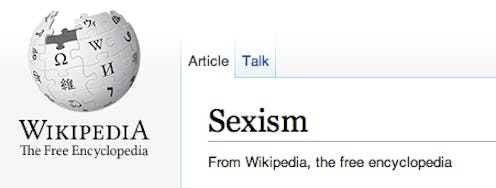News
Wikipedia Needs To Fix This

Let's face it: In 2014, Wikipedia is where everybody gets most of their information. Unfortunately, the online encyclopedia may not be the most unbiased source: Two professors have just received grants from the National Science Foundation to research sexism and Wikipedia. The grants, which total $200,000, will be given to academics at Yale University and New York University who are looking to delve into "systemic gender bias" and how it influences Wikipedia's content.
In a statement, The National Science Foundation said:
Unlike traditional encyclopedias, which are controlled by experts, Wikipedia was supposed to have democratized knowledge. Yet an emerging body of research indicates that Wikipedia suffers from systematic gender bias with respect to both contributors and content. How and why is this bias produced? ... Under-representation of female scholars and associated scholarship reduces the quality and completeness of Wikipedia, imposing significant costs on the millions of readers who rely on it. The findings from this research should clarify where in the complex chain of knowledge gender disparities arise.
Both professors will home in on which Wikipedia topics have the most gender disparities, and what Wikipedia can do to remedy the alleged gender imbalance.
Just how unbalanced is Wikipedia? Well, an estimated 90 percent of its editors are men. According to a Wikimedia Foundation report from September 2013, the site has more than 80,000 active volunteer editors. However, the foundation noted in a separate survey that the number of female editors has been increasing each year. For example, 14 percent of new Wikipedia editors were women in 2011, compared to 10 percent in 2010.
This isn't the first time Wikipedia's gender bias has been brought up. Over the last year, academics, science and technology professionals, sociologists and media lovers alike have been urging the online encyclopedia to address its lack of women editors.
Some critics of the site have taken the grassroots approach, including students at Brown University, who held a Wikipedia edit-a-thon last year on Ada Lovelace Day. Lovelace was a 19th-century mathematician who is recognized as one of the pioneers of computer science, but like many women in the STEM field, her legacy is still largely unknown. So, the female students at Brown were directed to edit the Wikipedia pages of women in the science, math and technology fields to bolster their contributions to those fields.
But does having more women editing Wikipedia pages really make a difference in the site's content? According to social media and tech expert Deanna Zandt, it does. Not only are articles on women or "women's topics" usually shorter than those on men or "men's topics," but as Zandt pointed out in Forbes, their content can be biased, misleading and, yes, sexist.
One of my own first forays into understanding the sexism of the Wikipedia community, and learning how it could right itself, was back in 2005. A very public conversation took place about the fact that the entry for “Woman” contained a list of (mostly derogatory) slang terms for women. On top of the abject negativity that section offered for the entry, there was also no comparable list in the entry for “Man.” ... Eventually, everyone agreed to move those terms to the “Misogyny” entry.
Wikipedia has also come under fire not just for an article's content, but also the topic of the article. For instance, the creation of an "American Women Novelists" Wikipedia list in 2013 sparked outrage among women writers who viewed the list as sexist because there was no corresponding "American Men Novelists" list. Instead, men just got to be "American Novelists" while women were moved to the "other" category.
As novelist Amanda Filipacchi pointed out in an op-ed for The New York Times:
People who go to Wikipedia to get ideas for whom to hire, or honor, or read, and look at that list of “American Novelists” for inspiration, might not even notice that the first page of it includes far more men than women. They might simply use that list without thinking twice about it. It’s probably small, easily fixable things like this that make it harder and slower for women to gain equality in the literary world.
Because of Wikipedia's democratic writing and editing process, it's unfair to say that Wikipedia itself is sexist. After all, The Wikimedia Foundation is well aware of the gender imbalance, and has set a goal to increase the number of women editors to 25 percent by 2015. But the gender imbalance does seem to affect which topics and articles are paid attention to, and which ones are largely ignored. And it seems that on Wikipedia, women are still relegated to subcategories and article footnotes.
Images: Wikipedia